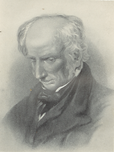This Lawn, A Carpet All Alive
by William Wordsworth
This Lawn, a carpet all alive
With shadows flung from leaves -- to strive
In dance, amid a press
Of sunshine, an apt emblem yields
Of Worldlings revelling in the fields
Of strenuous idleness;
Less quick the stir when tide and breeze
Encounter, and to narrow seas
Forbid a moment's rest;
The medley less when boreal Lights
Glance to and fro, like aery Sprites
To feats of arms addrest!
Yet, spite of all this eager strife,
This ceaseless play, the genuine life
That serves the steadfast hours,
Is in the grass beneath, that grows
Unheeded, and the mute repose
Of sweetly-breathing flowers.
Notes to the poem:
Written in 1829.
First published in 1835.
This lawn is the sloping one approaching the kitchen-garden, and was made out of it. Hundreds of times have I watched the dancing of shadows amid a press of sunshine, and other beautiful appearances of light and shade, flowers and shrubs. What a contrast between this and the cabbages and onions and carrots that used to grow there on a piece of ugly-shaped unsightly ground! No reflection, however, either upon cabbages or onions; the latter we know were worshipped by the Egyptians, and he must have a poor eye for beauty who has not observed how much of it there is in the form and color which cabbages and plants of this genius exhibit through the various stages of their growth and decay. A richer display of color in vegetable nature can scarcely be conceived than Coleridge, my Sister, and I saw in a bed of potato-plants in blossom near a hut upon the moor between Inversneyd and Loch Katrine. These blossoms were of such extraordinary beauty and richness that no one could have passed them without notice. But the sense must be cultivated through the mind before we can perceive those inexhaustible treasures of Nature, for such they truly are, without the least necessary reference to the utility of her productions, or even to the laws whereupon, as we learn by research, they are dependent. Some are of opinion that the habit of analyzing, decomposing, and anatomising is inevitably unfavorable to the perception of beauty. People are led into this mistake by overlooking the fact that such processes being to a certain extent within the reach of a limited intellect, we are apt to ascribe to them that insensibility of which they are in truth the effect, and not the cause. Admiration and love, to which all knowledge truly vital must tend, are felt by men of real genius in proportion as their discoveries in natural Philosophy are enlarged; and the beauty in form of a plant or an animal is not made less but more apparent as a whole by more accurate insight into its constituent properties and powers. A Savant who is not also a poet in soul and a religionist in heart is a feeble and unhappy creature.
Source:
The Complete Poetical Works of William WordsworthCopyright 1888
Thomas Y. Crowell & Co., New York
